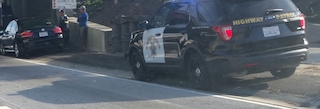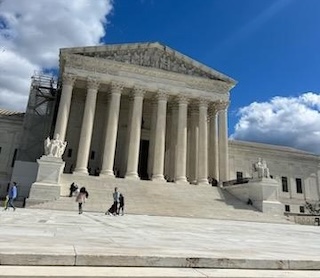There are many who lament the erosion of the Fourth Amendment guarantee against warrantless searches, which are presumed to be an unreasonable search and seizure in an area where one has a reasonable expectation of privacy.
A traffic stop is considered a detention, and as such a seizure if it is reasonable to believe the driver was not free to leave. To make such a stop legal, the officer must have a reasonable suspicion that the driver is committing a violation of the law.
What is sufficient reasonable suspicion? What are some examples of reasonable suspicion permitting a traffic stop?
On Monday, April 6, 2020, the U.S. Supreme Court answered that question by way of ruling in Kansas v. Charles Glover (2020 DJDAR 3088), with Justice Clarence Thomas writing the majority opinion.
The facts of the case could happen anywhere. A Kansas deputy sheriff driving along the highway decided to run a license plate check on a pickup truck driving along the same highway, presumably because the officer suspected the license plate was not for the truck. The check verified that the license plate did belong to the truck and it identified the registered owner of the truck as Charles Glover, Jr.
The sheriff then ran a check on the Glover’s driver’s license and discovered it was revoked.
The sheriff then assumed or inferred that Glover was driving the truck and pulled it over.
 Traffic Stop
Traffic Stop
Glover in fact was driving the truck. The deputy then arrested him as a habitual traffic offender, as this was not his first time driving on a revoked license.
Glover moved to suppress evidence of his identity as the driver, arguing that the deputy sheriff violated the Fourth Amendment because he made an investigative traffic stop, a seizure, without “a particularized and objective basis for suspecting the particular person stopped of criminal activity.” United States v. Cortez (1981) 449 U.S. 411, 417-418; see also Terry v. Ohio (1968) 392 U.S. 1, 21-22.
The Kansas Supreme Court hearing the motion granted the motion, finding that the deputy did not have reasonable suspicion to make the stop because his inference that Glover was behind the wheel amounted to “only a hunch” that the driver was engaged in criminal activity. The court further explained that his “hunch” involved “applying and stacking unstated assumptions that are unreasonable without further factual basis,” namely, that “the registered owner was likely the primary driver of the vehicle” and that “the owner will likely disregard the suspension or revocation order and continue to drive.”
The State of Kansas then filed a writ of certiorari to the United States Supreme Court, which reversed the high court in Kansas.
The U.S. Supreme Court began its analysis by agreeing that “although a mere ‘hunch’ does not created reasonable suspicion, the level of suspicion the standard requires is considerably less than proof of wrongdoing by a preponderance of the evidence, and obviously less than is necessary for probable cause.” Prado Navarrete v. California (2014) 572 U.S. 393, 397.
Because it is a “less demanding” standard than probable cause, “reasonable suspicion can be established with information that is different in quantity or content than that required to establish probable cause.” Alabama v. White (1990) 496 U.S. 325, 330.
Courts allow officers to “make commonsense judgments and inferences about human behavior.” Illinois v. Wardlow (2000) 528 U.S. 119, 125. Courts “cannot reasonably demand scientific certainty . . . where none exists.” Id.
Justice Thomas then held that the deputy “drew the commonsense inference that Glover was likely the driver of the vehicle, which provided more than reasonable suspicion to initiate the stop.” Thomas further held that “the fact that the registered owner of a vehicle is not always the driver of the vehicle does not negate the reasonableness of the deputy’s inference” and “[t]o be reasonable is not to be perfect.” Heien v. North Carolina (2014) 574 U.S. 54, 60.
Moreover, he commented, “empirical studies demonstrate what common experience readily reveals: drivers with revoked licenses frequently continue to drive and therefore post safety risks to other motorists and pedestrians.” See, e.g., 2 T. Neuman et al., National Coop. Hwy. Research Program Report 500: A Guide for Addressing Collisions Involving Unlicensed Drivers and Drivers with Suspended or Revoked Licenses p. III-1 (2003) (noting that 75% of drivers with suspended or revoked licenses continue to drive).
Accordingly, Thomas and the U.S. Supreme Court found that officer had sufficient reasonable suspicion to make the traffic stop and the arrest that followed.
 U.S. Supreme Court
U.S. Supreme Court
We believe this ruling is carte blanche for mischief by every police officer as a first option to justifying a traffic stop. We think it also opens a Pandora’s Box of further questions. Will reasonable suspicion remain if the registered owner with a revoked license is male and the driver is female, or visa versa? Here, the registered owner was a junior – how did the officer know the senior person by the same name was not driving? What if the traffic stop is at night? Can the officer just pull over any car if the registered owner has a revoked or suspended license?
The citation for the U.S. Supreme Court ruling discussed above is Kansas v. Charles Glover (2020) 589 U.S. ___, 140 S. Ct. 1183, 206 L. Ed. 2d 412.
For more information about traffic stops, please click on the following articles:
 Traffic Stop
Traffic Stop U.S. Supreme Court
U.S. Supreme Court